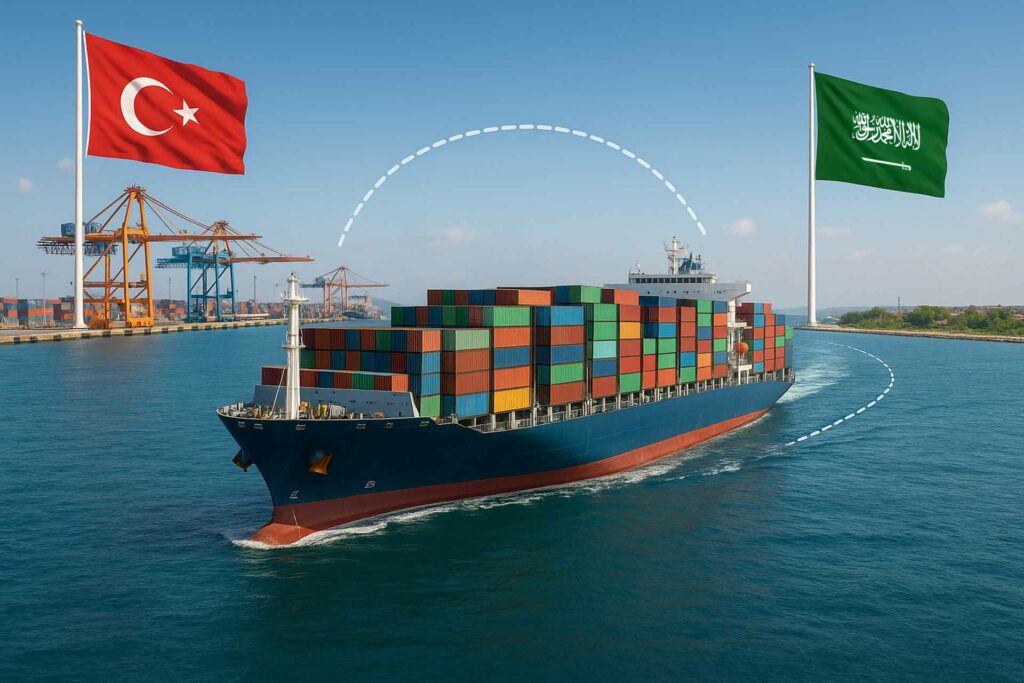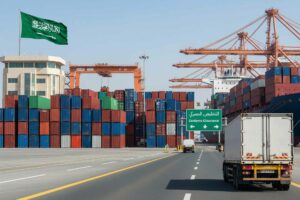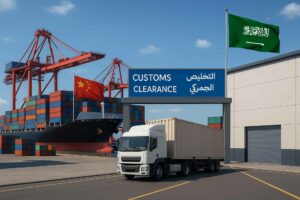Sea freight remains one of the most cost-effective and reliable methods for transporting large or heavy shipments—especially when speed isn’t a top priority. With the continued evolution of international trade regulations and customs systems, it’s essential to understand the full process of sea freight between Turkey and Saudi Arabia to ensure efficient and smooth shipping.
Why Choose Sea Freight from Turkey to Saudi Arabia?
1. Cost-Effective for Bulk Shipments
Sea freight offers significant savings compared to air freight—particularly for full-container loads or larger shipments.
2. High Cargo Capacity
Ships can transport massive quantities of goods using large containers, making sea freight ideal for industrial or bulk orders.
3. Eco-Friendly Option
Sea freight has a lower carbon footprint per ton of cargo, making it a more sustainable solution for long-distance transport.
4. Versatility in Cargo Types
From raw materials and industrial equipment to construction materials, sea freight is suitable for a wide range of product categories.
Main Types of Sea Freight
1. Full Container Load (FCL)
Renting an entire container gives shippers full control over cargo space, ideal for large or high-value shipments.
2. Less Than Container Load (LCL)
Your goods share container space with others, and you pay only for the space your shipment occupies. This is ideal for smaller or medium-sized shipments.
Note: LCL can take slightly longer due to consolidation and deconsolidation at ports.
Key Seaports Connecting Turkey and Saudi Arabia
🇹🇷 Major Turkish Ports (Port of Origin):
- Mersin: Gateway of Anatolia to the Middle East.
- Izmir: Industrial city on Turkey’s western coast, serving western regions.
- Istanbul: Hosts major ports like Ambarli and Haydarpaşa—Ambarli is the busiest.
- Iskenderun: Located in Hatay Province on the Mediterranean, a key southern Turkish port.
🇸🇦 Major Saudi Ports (Port of Destination):
- Jeddah Islamic Port: Largest port in the Kingdom; main hub for central and western regions.
- Dammam (King Abdul Aziz Port): Serves eastern and central areas; key Gulf gateway.
- King Abdullah Port: A modern, high-tech port between Jeddah and Rabigh.
Step-by-Step Sea Freight Process from Turkey to Saudi Arabia
- Request a Freight Quote:
Contact a trusted freight forwarder like Panglobe Logistics with detailed shipment info: type of goods, weight, dimensions, origin and destination ports. - Book Your Cargo Space:
Reserve container space on the selected vessel. - Pickup and Transport to Port:
The goods are collected from the supplier’s warehouse in Turkey and delivered to the departure port. - Export Customs Clearance in Turkey:
A licensed customs agent handles export formalities and paperwork at the origin port. - Shipping and Arrival in Saudi Arabia:
The vessel docks at the designated Saudi port, and containers are offloaded. - Import Customs Clearance in KSA:
This critical step requires all necessary documentation to be submitted through platforms like Fasah. - Final Delivery:
The shipment is transported from the port to the importer’s warehouse or final destination.
Required Documents for Sea Freight Between Turkey and Saudi Arabia
- Commercial Invoice: Must be detailed, listing HS codes, product values, quantities, and terms of sale.
- Packing List: Specifies contents of each package including quantity, dimensions, and weight.
- Bill of Lading: Issued by the shipping company; serves as a receipt and contract of carriage.
- Certificate of Origin: Indicates the origin of goods; must be certified by a Chamber of Commerce in Turkey.
- Product Certificate of Conformity: Required for most imports into Saudi Arabia; issued via the SABER platform.
- Shipment Certificate of Conformity: Also mandatory for each consignment; issued through SABER.
- Saudi Importer’s Commercial Registration (CR).
- Saudi Importer’s Tax ID Number.
- Special Documents: May include health certificates for food, or approvals from SFDA for pharmaceutical or medical items.
- Cargo Insurance Policy: If applicable.
Customs Duties and Taxes in Saudi Arabia
- Customs Duties: Rates vary by product category and HS code.
- Value-Added Tax (VAT): 15% on most imports, calculated on the CIF (Cost + Insurance + Freight) value plus customs duties.
- Excise Tax: Applies to specific items like soft drinks and tobacco products.
- E-Customs Clearance: All customs declarations are processed electronically through platforms like Fasah.
Final Note
Sea freight is an efficient, cost-effective, and scalable option for shipping from Turkey to Saudi Arabia. But to truly optimize your logistics, you need a reliable partner who understands every step of the process.
Panglobe for Business and Logistics Services offers end-to-end support—from freight booking and customs clearance to final delivery.
Need help? Contact our logistics experts today:
📞 +966 50 370 8666
📞 +966 11 269 7035





